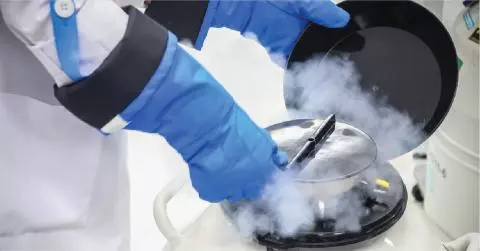What Is Egg Freezing and Who Should Consider Preserving It?

The most reproductive age for a woman is in her early twenties. Today, around 40 to 50 per cent of women that fall in this reproductive age group do not have children. This is mostly due to the fact that couples are more focused on their careers or are concerned about their financial limitations. Unfortunately, a woman’s biological clock does not keep pace, resulting in a number of challenges when starting a family.
A relatively new development in reproductive medicine allows a woman to cryopreserve or freeze her eggs in her early reproductive years and use these oocytes (eggs) to have a baby when she is ready in the future. Women are increasingly opting for oocyte cryopreservation as the method to preserve or delay their fertility. Today, more than 3000 babies have been born worldwide with the use of frozen eggs.
What Is Oocyte Cryopreservation?
Oocyte cryopreservation, also known as egg freezing, is a process wherein a woman’s eggs are extracted, frozen and stored for later use. The treatment cycle is similar to that of an IVF procedure, beginning with ovarian stimulation, wherein medications that contain Follicle Stimulating Hormones are administered in the form of an injection for about 10 to 12 days.
Once the eggs are ready, they are retrieved through a procedure known as oocyte harvesting or the ‘egg retrieval’ process. During this process the eggs are removed with a needle placed through the vagina with the help of an ultrasound machine. An intravenous sedation is given to the patient, which makes the procedure quite painless.
The retrieved eggs are then, evaluated in the clinical laboratory and frozen in cryo-protectants. The cryo-protectant is a mixture of solvents that safeguard the delicate eggs from intracellular ice formation during the freezing process. (Formation of ice crystals inside the cell structure of the egg can cause damage to the membranes and rupture the cell.) When a patient is ready to use the eggs, they are thawed and fertilized with a single sperm in an Intra Cytoplasmic Sperm Injection (ICSI) cycle and transferred back to the uterus as an embryo to achieve pregnancy.
Who Should Consider Preserving Their Eggs?
- Oocyte cryopreservation can prove to be extremely beneficial for women who have been diagnosed with cancer and are scheduled for some kind of oncological treatment like radiotherapy or chemotherapy. When the woman successfully completes her treatment, these frozen oocytes can be used to have a baby with the help of IVF/ICSI treatment. For patients who have undergone hysterectomy or other surgeries that do not allow her to carry a natural pregnancy, the same oocytes can be used along with donor or partner sperm to achieve pregnancy through a surrogate.
- Women who are unmarried or are in a situation that is not conducive to childbearing, can also opt for oocyte cryopreservation. This allows them to buy time and choose when they would like to start a family. In any case, it is important that a woman considering this option freezes her eggs at a time when her eggs are still viable, in order to improve her chances of getting pregnant.
Egg freezing should be considered as an option and not a certainty for having children in the future. Many women who opt for elective freezing of eggs may never actually utilize them as they might conceive naturally. However, it certainly gives hope to those who want to postpone motherhood due to financial, psychological or physiological reasons.
 Infertility Counselling
Infertility Counselling Female Infertility Treatment
Female Infertility Treatment Andrology Treatment
Andrology Treatment Fertility Enhancing Surgeries - Female
Fertility Enhancing Surgeries - Female Fertility Enhancing Surgeries - Male
Fertility Enhancing Surgeries - Male Endoscopy Treatment
Endoscopy Treatment IUI Treatment
IUI Treatment IVF Treatment
IVF Treatment ICSI Treatment
ICSI Treatment Advanced IVF Solutions
Advanced IVF Solutions Embryology
Embryology Vitrification Egg, Embryo, Sperm Freezing
Vitrification Egg, Embryo, Sperm Freezing Preimplantation Genetic Testing (PGT)
Preimplantation Genetic Testing (PGT) Donation Program Embryo / Egg / Sperm
Donation Program Embryo / Egg / Sperm Self-cycleTM IVF
Self-cycleTM IVF

 Self-cycleTM IVF
Self-cycleTM IVF










